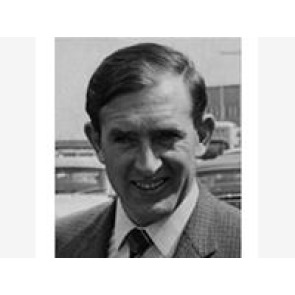DANNY BLANCHFLOWERAn outstanding midfielder, renowned for both his time at Spurs and captaincy of Northern Ireland, Danny Blanchflowerdied on 9 December, 1993.
His celebrated captaincy at Spurs during his 10 years at White Hart Lane and, in particular, his remarkable talent for passing cemented his reputation as a true great in the footballing world. He was awarded the title of English Footballer of the Year on two separate occasions, a feat which only a handful of players ever accomplished.
Besides his career on the pitch, he was also an acclaimed journalist in later life, working for the Sunday Express and also commentating in America.
Robert Dennis Blanchflower was born on 10 February, 1926, in Belfast, Northern Ireland. The son of a footballer who had played as a centre-forward in a women’s team, he was educated at Ravenscroft Public Elementary School and later won a scholarship to attend the Belfast College of Technology.
However, he dropped out to become an apprentice electrician and, in 1943, lied about his age to join the RAF. A trainee navigator, he was subsequently sent on a training course at St Andrew's University and even posted to Canada, but, by 1946, was back in Belfast where he began to develop his skills as a footballer.
His professional career on the pitch began with Belfast side Glentoran during the late 1940s, eventually signing for Barnsley in 1949 for a fee of £6,000. He spent two years with the South Yorkshire club before Aston Villa bought him for £15,000 in 1951. Altogether, he would play 155 times for Villa and captained the side on numerous occasions.
In 1954 Mr Blanchflower joined Tottenham Hotspur, undoubtably the highlight of his illustrious career. Spurs were so impressed with his ability that they paid the then enormous sum of £30,000 to secure him. During hisdecade with the club, he made 337 league appearances.
1961 saw him lift the FA Cup as captain and lead Spurs to win the league, making his team the first of the 20th century to win the double.
A second FA Cup victory followed a year later, although narrowly missing out on the double, and, in 1963, Mr Blanchflower captained his side to take the European Cup Winners’ Cup.
Meanwhile, he earned an impressive 56 caps for Northern Ireland between 1949 and 1963, the first Irishman to ever achieve such a feat, and even led his country to the quarter-finals of the 1958 World Cup in Sweden.
He retired as a player in the summer of 1964, going on to manage Northern Ireland and, later, Chelsea for whom he won just five games out of 32. The club subsequently plummeted down the league table and Mr Blanchflower resigned less than a year after his appointment. He went on to begin a career in journalism, gaining a reputation for his work at the Sunday Express where he remained for 24 years.
In later life hedevelopedAlzheimer ’s disease anddiedin a London nursing home on 9 December, 1993, at the age of 67.
TodayMr Blanchflower is still remembered as one of the most talented players to ever grace the pitch - an Irish legend who was made a member of the English Football Hall of Fame in 2003.
He became the first person to ever turn down television’s ‘This Is Your Life’ by simply walking away from itshost Eamonn Andrews live on air and declaring, “Nobody is going to press gang me into anything.”
He briefly commentated for US television network ‘CBS’ during the 1960s, later recounting how his frankness about the National Professional Soccer League teams distressed executives.
“The game is about glory,” he once said. “It is about doing things in style and with a flourish, about going out and beating the other lot, not waiting for them to die of boredom.”
Keep me informed of updates





